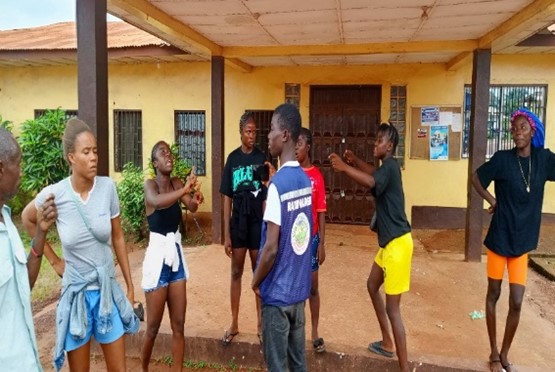In Margibi County, Liberia, the kickball players of the Margibi County Team have staged a protest demanding payment for their participation in the 2024 National County Sports Meet. The players, who were promised a stipend of $200 each by the Margibi Sports Association, have grown increasingly frustrated after months of waiting without compensation. Protesting outside the office of County Superintendent Victoria Worlorbah Duncan, they forcibly locked the administrative offices, preventing Duncan and her team from conducting their duties. The players expressed their determination to remain at the site until their payments are made, conveying a sense of urgency and disappointment toward local officials.
The players, numbering at least 18, took drastic measures by physically locking the entrance to the administrative building. Their unrest reflects deeper issues regarding the management of funds intended for the players and highlights woes stemming from leadership disorganization within the Margibi Sports Association. This protest marked its second day, indicating a willingness among the athletes to disrupt local governance if their demands remain unmet. In the heightened emotional atmosphere, the players openly voiced their frustrations, even resorting to verbal abuse directed at local officials as well as the mother of the former MSA Chairman, Abu Fofana, who is accused of misusing the funds meant for the team.
The ongoing conflict sheds light on a substantial controversy. Reports indicate that funds raised for the team, including allocations from local lawmakers, were mishandled by Fofana, who stepped down from his position shortly after facing accusations from his colleagues. In a public meeting preceding his resignation, officials confronted him about his alleged mismanagement, which led to the Superintendent assuring the team that an investigation would occur. This revelation has only fueled the players’ anger, as they seek accountability and transparency from those in charge. Players have expressed their distrust in the county administration’s promises, leading to the conclusion that more aggressive forms of protest may be necessary.
Underlying this unrest is the hopeless predicament faced by the players who, even after the sporting event, are suffering due to the lack of financial support. The emotional toll is compounded by recent violent demonstrations in nearby locales, which have resulted in a climate of fear among local public servants, adversely affecting their productivity. Margibi County’s workers now navigate an unsettling environment, seeking to understand the implications of the athletes’ protest against backsliding leadership and mismanagement. As athletes demand their owed payments, they vocalize frustrations at what they perceive as negligence from the capital’s administration.
The implications of this protest extend beyond mere financial disputes; they signal a greater critique of the administrative structures within Margibi County. The players’ demands are exacerbated by the apparent inaction of local government officials who have failed to effectively address financial mismanagement claims. Tensions between players and the county leadership reflect broader societal grievances regarding accountability and the rightful distribution of resources. As discontent mounts, it emphasizes the volatile nature of public trust in local governance, leaving players wondering if their actions will spur meaningful change.
Overall, this labor dispute in Margibi County showcases the intersection of sports, governance, and community expectations. The situation not only raises questions about the efficacy and reliability of the Margibi Sports Association but also serves as a poignant reminder of the necessity for transparency in managing community resources. As the protest continues, the county administration faces an urgent call to restore faith among its constituents, particularly the frustrated athletes, who assert their right to compensation and accountability from those in power. The unfolding events may serve as a catalyst for change, potentially prompting a reevaluation of both resource management and player rights within the local sports arena.


